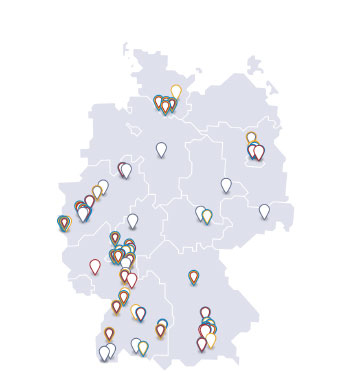Berlin Land prizes awarded for animal-free research on flu viruses and stroke disease
On October 12, 2017, the "Prizes to promote research methods to replace or complement animal experiments" were awarded for the fourth time by the State of Berlin. The prizes were sponsored by the German Association of Research-Based Pharmaceutical Companies (vfa) and the Berlin Veterinary Association. The awards went to projects on animal-free identification of flu viruses and the development of a platform that uses brain tissue produced from human stem cells as a model for research into stroke disease. The prizes are worth a total of 25,000 euros.
Every two years, these prizes are awarded to research projects in Berlin or Brandenburg that make a contribution to eliminating or reducing the use of experimental animals or to reducing the stress suffered by the animals in animal testing. This year the prizes were awarded by Dr. Dirk Behrendt, the Senator for Justice, Consumer Protection and Anti-Discrimination in the State of Berlin.
An animal-free human brain model for research into stroke disease
Dr. Philipp Mergenthaler and Dr. Harald Stachelscheid from the Charité University Hospital Berlin and the Berlin Institute of Health (BIH) were awarded the prize for the development of a model platform that simulates human brain tissue in two and three-dimensional systems.

The prizewinners Dr. Harald Stachelscheid (2nd from left) and Dr. Philipp Mergenthaler (3rd from left) with Senator Dr. Dirk Behrendt (left), Dr. Heidemarie Ratsch (President of the Berlin Veterinary Association), Dr. Siegfried Throm (vfa, 2nd from right) and Prof. Dr. Ulrich Dirnagel (Charité Berlin, right) who presented the awards
These human nerve cells and cerebral organoids (in other words, tissue that is similar in structure to the brain and also replicates some of its functions) are intended to be used in the study of complex disease processes and in the development of new treatment methods for stroke disease. So, in the future, fewer experiments using mice and rats should be necessary; currently, a considerable amount of stroke research is conducted using these animals. The novel models are constructed using induced pluripotent stem cells which are derived from adult human cells. The researchers use automated microscopy and imaging analysis for investigations using these models. The aim of the present project is to show that findings, which have already been obtained using traditional methods, can be reproduced in this way. The ongoing aim is to obtain new findings on stroke and stroke treatment.
Dr. Mergenthaler is a neuroscientist and physician in the Department for Experimental Neurology, Center for Stroke Research Berlin, the NeuroCure Clinical Research Center and the Department of Neurology at the Charité and Fellow of the Charité-BIH Clinical Scientist Program. Dr. Stachelscheid is a stem cell biologist at the Berlin Brandenburg Center for Regenerative Therapies and head of the BIH Stem Cell Core Facility.
Identifying flu viruses without using animal sera
Professor Dr. Frank Bier, Dr. Henry Memczak, Dr. Marc Hovestädt, PD Dr. Thorsten Wolff and Dr. Nenand Gajovic-Eichelmann received the prize for their ongoing research on "Developing a peptide-based subtyping platform for flu viruses (FluType)". They work at the University of Potsdam, the Robert Koch Institute (Berlin) and the Fraunhofer Institute for Cell Therapy and Immunology - Department of Bioanalytics and Bioprocesses (Potsdam). In a few years, the test system developed by their consortium could replace the thousands of ferrets hitherto required worldwide every year for determining the "subtype" of flu viruses from which a specific patient is suffering.

Senator Dr. Dirk Behrendt (left), the prize winners (from l. to r.) Dr. Mark Hovestädt, Dr. Henry Memczak, Dr. Nenand Gajovic-Eichelmann, PD Dr. Thorsten Wolff, Dr. Heidemarie Ratsch (President of the Berlin Veterinary Association), Prof. Dr. Dr. Ralf Einspanier (Free University of Berlin, 2nd from right), who awarded the prize, and Dr. Siegfried Throm (vfa, right)
For not all flu viruses are the same; at any given time, there are different variants of flu viruses in circulation - these are called subtypes and identified by abbreviations such as A(H5N1) or A(H7N9). In addition, due to natural genetic modifications, new subtypes are always appearing. Every year it must be clarified which subtypes are currently the most important worldwide before vaccine production starts for annual flu protection, because vaccines can only protect against precisely those flu subtypes for which they have been developed. This requires studies on virus samples throughout the world; in Germany, for example, this takes place at the Berlin Robert Koch Institute. Up till now, however, virus experts have been relying for subtype determination on so-called "specific hyperimmune sera" from the blood of thousands of ferrets, whose production takes several weeks.
In contrast, the new system will manage without animals and will deliver results faster. This can then make flu vaccines a more reliable match to the virus subtypes that are predominantly in circulation. The new subtype determination method is currently being tested for its reliability.
vfa has been the sponsor of the prize since 2011
Dr. Siegfried Throm, Director of Research/Development/Innovation at the German Association of Research-Based Pharmaceutical Companies, explained vfa's involvement, "Already, pharmaceutical companies are minimizing the use of experimental animals whilst providing them with the best possible welfare. They are focused on pursuing the goal of further reducing the number of animals used. To this end, they are themselves developing alternative methods and are also interested in methods that are being developed elsewhere - not least because animal experiments are expensive and time-intensive. The scientists receiving the award today have demonstrated with their new animal-free test systems how much can be achieved in this field using the latest biological methods. We hope that these examples will provide impetus far beyond Berlin and Brandenburg for more projects using fewer animal experiments."
The vfa has been sponsoring the State of Berlin prize since it was established in 2011.



